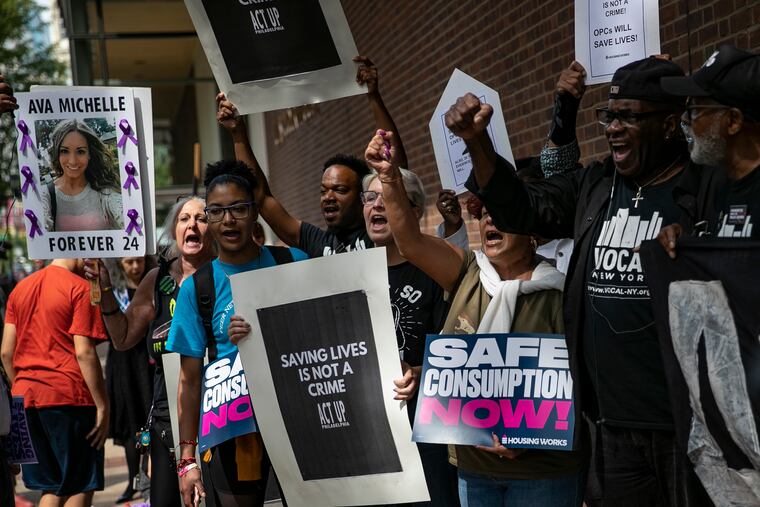Philly develops safety plan for supervised injection site as opening nears
The city’s safety plan for the site is intentionally broad: “It wasn’t site-specific, and it doesn’t need to be site-specific,” city Managing Director Brian Abernathy said in an interview.

With Philadelphia’s supervised injection site inches closer to opening, the city and the site’s backers have begun making plans to protect its clients — and the surrounding neighborhood.
City officials have released a public safety plan for the area around the site, whose location has not yet been announced. And late last month, Safehouse, the nonprofit behind the site, hosted a training session for “site escorts” who will help clients get inside. The concern is that they might have to wade through protesters and federal officials who have threatened to shut down the site.
The scenario may sound familiar, given similar measures at some abortion providers. But Philadelphia is blazing a new trail here, as it is set to become the first American city with an officially sanctioned place for people in addiction to use drugs under medical supervision. Long established in Canada and European countries, the sites are considered a “harm reduction strategy,” needed to keep people in addiction alive. Philadelphia has had the nation’s highest big-city fatal overdose rate for several years.
A federal judge ruled in October that Safehouse’s proposal did not violate federal law, but Safehouse officials have asked for an additional final ruling in their favor on the matter, and have said they plan to open “as soon as possible” after that ruling is handed down.
The city’s safety plan is intentionally broad and doesn’t designate any particular location. “It wasn’t site-specific, and it doesn’t need to be site-specific,” city Managing Director Brian Abernathy said in an interview. But city officials have laid out the plan in-person to neighbors in Kensington, the community at the epicenter of Philadelphia’s overdose crisis, and which is considered a likely location for a site. South Philadelphia, which also has been especially hard hit by overdoses, is another area that has been discussed.
“There’s a lot of anxiety around an overdose prevention site,” Abernathy said, using the city’s term for the facilities, where people in addiction will be able to use their own drugs under medical supervision, be revived if they overdose, and access treatment and other services.
» READ MORE: Philadelphia to get nation’s first supervised injection site: How we got here
Police will patrol the area, and narcotics officers will target any dealers trying to sell drugs around the site, Abernathy said. According to a summary on the city’s website, officials have committed to “ensuring” that drug sales, crime, and loitering will not increase around the site; that Safehouse clients “respect residents’ and businesses’ safety and property”; and that clients are not “intimidated” as they approach the site.
Local police will neither interfere with nor assist federal authorities who have threatened to shut down the site and arrest its clients, Abernathy said.
After the initial federal ruling last fall, U.S. Attorney William McSwain said he planned to appeal and later threatened to “use all enforcement tools” at his disposal to shut down any site that opens before the appeals process was complete. Drug seizures, arrests, and criminal forfeiture proceedings are all on the table, he has said.
“We’re not going to interfere, but we’re not going to assist,” Abernathy said. “We have to see how federal law enforcement responds when a site is open.”
At Safehouse’s training for site escorts last month, representatives from Philadelphia’s chapter of the American Civil Liberties Union advised volunteers on how to shepherd clients past law enforcement on their way into the site.
“When the site opens, there may be a circus-like atmosphere,” said Mary Catherine Roper, an ACLU lawyer. “There will be angry neighbors, press, and people trying to get in and out of the building. You’re there to give heart, be a bit of a shield, and de-escalate the situation.”
She advised potential site escorts to ask federal law enforcement officers who try to question clients on their way into the site whether they are being detained, or whether they are free to leave. “Part of your job with a participant is to say, ‘We can go,’” Roper said.
Safehouse and Abernathy have declined to comment on where a first site might open, or what it might look like. But Peter Goldberger, a criminal defense appeals lawyer who also spoke at last month’s meeting, said it was likely that the site would be part of a larger medical facility, not a standalone storefront.
That kind of location could help shield clients looking to use the site, he said, explaining that entering a medical facility isn’t enough to provide reasonable suspicion of a crime.
Abernathy said the city will monitor its own police operations on the site and modify them as necessary.
“There is going to need to be significant outreach from the operators to make sure folks feel comfortable,” he said. “We’re going to have to learn as we go and adjust deployment. Things change over time — the needs are going to change over time. We have to be flexible.”